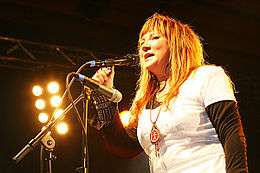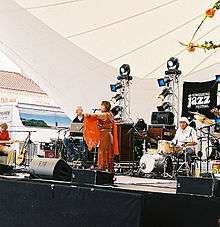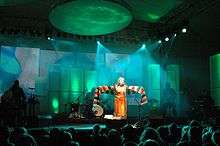Mari Boine
Mari Boine (born Mari Boine Persen, 8 November 1956) is a Norwegian singer. She combined traditional yodeling folk music, or yoik, with rock.[1] In 2008, she became a professor of musicology at Nesna University College.[2]
Mari Boine | |
|---|---|
 Mari Boine performing at Riddu Riđđu in 2006 | |
| Background information | |
| Birth name | Mari Boine Persen |
| Born | 8 November 1956 Karasjok, Finnmark, Norway |
| Genres | Yoik, folk rock |
| Occupation(s) | Singer |
| Years active | 1980s–present |
| Labels | Real World |
| Website | mariboine |


Biography
Boine was born and raised in Gámehisnjárga, a village on the river Anarjohka in Karasjok municipality in Finnmark, in the far north of Norway.[3]
Boine's parents were Sami. They made a living from salmon fishing and farming. She grew up steeped in the region's natural environment, but also amidst the strict Laestadian Christian movement with discrimination against her people: for example, singing in the traditional Sami joik style was considered "the devil's work". The local school that Boine attended reflected a very different world from her family's. All the teaching was in Norwegian.[4]
Anti-racism
As Boine grew up, she started to rebel against the prejudiced attitude of being an inferior "Lappish" woman in Norwegian society. For instance, the booklet accompanying the CD 'Leahkastin' (Unfolding) is illustrated with photographs with racist captions like "Lapps report for anthropological measurement", "Typical female Lapp", "A well-nourished Lapp"; and it ends with a photo of Boine herself as a girl, captioned "Mari, one of the rugged Lapp-girl types" and attributed "(Photo: Unidentified priest)".[5]
When Boine's album Gula Gula was first released on Peter Gabriel's RealWorld label in July 1990, its front cover (see illustration) showed an iconic image of the tundra of the far north, the eye of a snowy owl. The front cover curiously did not show the name of the album, or the name or face of Mari Boine herself; the back cover printed the name 'Mari Boine Persen', the Persen surname identifying her as a Norwegian rather than a Sami.[6] On the 2007 release on her own Lean label,[7] the album cover explicitly names Mari Boine with her Sami surname, and shows her (see illustration) in full Sami costume as a shamanistic dancer of her own people, while the white background, like the snowy owl of the original release, hints at the snows of the north.
Boine was asked to perform at the 1994 Winter Olympics in Lillehammer, but refused because she perceived the invitation as an attempt to bring a token minority to the ceremonies.[8]
Musical style
Boine's songs are strongly rooted in her experience of being in a despised minority. For example, the song 'Oppskrift for Herrefolk' (Recipe for a Master Race) on her breakthrough CD 'Gula Gula', sung in Norwegian unlike the rest of the songs which are in Sami, speaks directly of 'discrimination and hate', and recommends ways of oppressing a minority: "Use bible and booze and bayonet"; "Use articles of law against ancient rights".[9]
Boine's other songs are more positive, often singing of the beauty and wildness of Sapmi (Lapland). The title track of 'Gula Gula' asks the listener to remember 'that the earth is our mother'.[10]
Boine sings in a traditional Saami style, using the 'yoik' voice, with a range of accompanying instruments and percussion. For example, on 'Gula Gula' the instruments used are drum, guitar, electric bass clarinet, dozo n'koni, ganga, claypot, darboka, tambourine, seed rattles, cymbal, clarinet, piano, frame drum, saz, drone drum, hammered dulcimer, bosoki, overtone flute, bells, bass, quena, charango and antara.[11]
Reception
Rootsworld, interviewing Boine in 2002, described her as "an unofficial Sami cultural ambassador".[12]
The Guardian, in its 2010 F&M playlist of songs "they just can't turn off", describes My Friend of Angel Tribe with the words "Norwegian Sami singer Boine, with this soft, melancholy and utterly mesmerising song."[13]
Johnny Loftus, reviewing Boine's Eight Seasons, wrote that "Boine seems to have been inspired, collaborating with producer Bugge Wesseltoft for a collection of pieces weaving her alternately supple and intimate, angry and otherworldly vocals into moody arrangements tinged with jazz influence and electronic programming."[14] While there was a degree of cliché in that, wrote Loftus, it worked well, concluding: "Boine's voice, filtered at first behind the halting notes of a guitar, builds in strength over the brooding electronic rhythm, until her Joik overtakes the electronics completely, becoming fully responsible for the song's deep, chilly atmosphere. Let's see a keyboard's hard drive do that."[14]
Awards
In 2003, Boine was awarded the Nordic Council Music Prize. She was appointed knight, first class in the Royal Norwegian Order of St. Olav for her artistic diversity on 18 September 2009.[15] On 7 October 2012, Boine was appointed as a "statsstipendiat", an artist with national funding, the highest honour that can be bestowed upon any artist in Norway.[16]
Boine has received other awards as follows:
| Awards | ||
|---|---|---|
| Preceded by Arve Tellefsen |
Recipient of the Open class Spellemannprisen 1989 |
Succeeded by No Open class award |
| Preceded by Ole Edvard Antonsen |
Recipient of the Open class Spellemannprisen 1993 |
Succeeded by No Open class award |
| Preceded by Anne Grete Preus |
Recipient of the Open class Gammleng-prisen 1993 |
Succeeded by Maj Britt Andersen |
| Preceded by Arne Dagsvik |
Recipient of the Nordlysprisen 1994 |
Succeeded by Bjørn Andor Drage |
| Preceded by Terje Rypdal |
Recipient of the Open class Spellemannprisen 1996 |
Succeeded by Nils Petter Molvær |
| Preceded by Solveig Kringlebotn |
Recipient of the Norsk kulturråds ærespris 2009 |
Succeeded by Tor Åge Bringsværd |
| Preceded by Arve Tellefsen |
Recipient of the Spellemannprisen honorary award 2017 |
Succeeded by - |
Discography
- Radiant Warmth (Antilles 1996)
- Eallin (Antilles/Lean 1996)
- Mote I Moskva (BMG Ariola A/S, 1992)
- It Ain't Necessarily Evil, Bodes Bat Gal Buot Biros: Mari Boine Remixed Vol. II (EmArcy/Universal, 2008)
- Jaskatvuođa Maŋŋa (Etter Stillheten) (Hot Club 1985)
- Gula Gula (Hor Stammodrenes Stemme) (Idut 1989)
- Remixed/Oðða Hamis (Jazzland 2001)
- Salmer Pa Veien Hjem (Kirkelig Kulturverksted 1991)
- Kautokeino-Opproret (Lean 2008)
- Goaskinviellja/Ornebror (Lean 1993)
- Eight Seasons=Gavcci Jahkejuogu (Lean/EmArcy/Universal, 2002)
- Cuovgga Airras/ Sterna Paradisea (Lean/EmArcy/Universal, 2009)
- Idjagieðas/In the Hand of the Night (Lean/Universal, 2006)
- See the Woman (MPS, 2017)
- Leahkastin (Sonet/Lean, 1994)
- Gilvve Gollat=Sow Your Gold (Universal, 2013)
Also appears on
- Beginner's Guide to Scandinavia (2011)
- Nordic Woman (2012)
- One World One Voice (1990)
With Jan Garbarek
- Twelve Moons (ECM, 1992)
- Visible World (ECM, 1995)
References
- Donelson, Marcy. "Mari Boine". AllMusic. Retrieved 3 May 2020.
- "Mari Boine blir musikkprofessor". Dagbladet.no. 6 December 2008.
- Unofficial Biography of Mari Boine, 1996. "Archived copy". Archived from the original on 5 June 2011. Retrieved 2 September 2011.CS1 maint: archived copy as title (link)
- Mari Boine, Biography, "Archived copy". Archived from the original on 3 October 2011. Retrieved 2 September 2011.CS1 maint: archived copy as title (link)
- Booklet accompanying CD 'Leahkastin', Mari Boine, Verve World (523889-2), 1994.
- "RealWorld". RealWorldRecords.com. July 1990. Retrieved 11 November 2011.
- Erdal, Silje F. (23 March 2011). "Lean Record Label". Folkmusic.no. Retrieved 11 November 2011.
- "lyrics". Oook.info.
- Mari Boine Persen, Gula Gula lyrics. "Archived copy". Archived from the original on 31 March 2012. Retrieved 2 September 2011.CS1 maint: archived copy as title (link)
- Booklet accompanying CD, Gula Gula, Mari Boine Persen, Real World Records (CDRW13), 1990.
- Lipp, Marty (2002). "RootsWorld Recording Review". RootsWorld.com. Retrieved 11 November 2011.
- Salmon, Chris (20 May 2010). "The Guardian: Playlist". Theguardian.co.uk. Retrieved 11 November 2011.
- Loftus, Johnny. "Review". AllMusic. Retrieved 24 January 2012.
- "Utnevnelse til St. Olavs Orden". Kongehuset.no.
- Nordseth, Pål (7 October 2012). "Hadia overrasket med statsstipend på døra Nå får Mari Boine 416 000 statlige kroner i året til hun blir pensjonist". Dagbladed.no. Retrieved 23 February 2013.
External links
| Wikimedia Commons has media related to Mari Boine. |
- Official website

- Mari Boine's entry at the Music Information Centre Norway
- Mari Boine interview at allaboutjazz